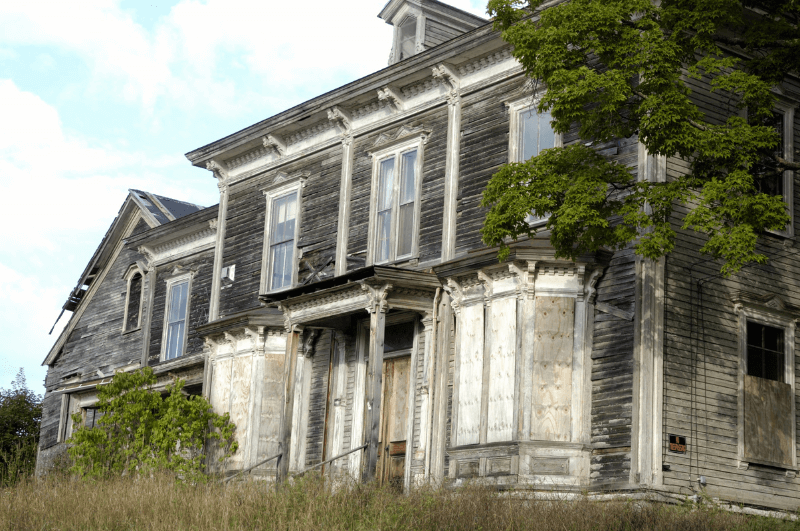
Are you living in a home that is falling apart, decrepit, and unsafe? If so, this could be considered an ‘unlivable’ home — a slippery slope leading to legal issues, tenant vs. landlord disputes, and code violations.
In most cases, you can consider this property ‘condemned’. But what does that mean?
A condemned property is a building or property that local authorities have seized or claimed after deeming it uninhabitable or unusable. If the government states the building is unsafe due to health concerns or safety issues, the landlord and tenants must make alternate plans.
So, what happens to the tenants and landlord in this scenario? Understanding the next move for tenants is crucial to knowing your rights, where you can go, and your right to compensation.
We have done the research, so you know your legal rights moving forward in this scenario.
The last thing you want as a tenant is to be left in the dark and not know how to proceed. But with this helpful guide, you can figure out your rights, where to stay during the renovation process, and the financial compensation owed for the remaining part of the lease.
What Happens to Tenants When a Property Is Condemned
Authorities deem a condemned property ‘unlivable’ due to structural damage or neglect. In this case, the building does not adhere to the housing code of the local government.
If tenants live on condemned property, this can lead to a tricky scenario for all involved. If this occurs, the tenants will have no choice but to move.
They cannot return to the condemned house except to gather their belongings until the completion of the required renovations or repairs. The renovations depend on the specific problems that caused the initial issue.
For example, if there are structural concerns with the floor, the flooring must be replaced or fixed before the tenants can return. Properties must be up to the standard of local building codes and local housing authority regulations.
If you don’t fix your Wisconsin condemned house and you leave it to deteriorate, the renters cannot stay on the property due to safety issues.
In most cases, condemned houses that are unlivable and left to rot can be hazardous due to disease, mold, animal infestation, pest infestation, or structural destruction.
There are many reasons why authorities may condemn your house. The most common reasons are plumbing issues, expanding neighborhoods, unsanitary living conditions, missing permits, or unsafe working conditions.
If this occurs, a tenant will have to leave the property. Although the rules vary based on the state, tenants typically receive a letter that requires them to leave the premises since it is no longer fit for human habitation.
Do you need help with your property? We can help you find houses residents love and can offer help with these issues.
Tenants’ Rights If a Property Is Condemned
If authorities condemn property, the tenants have rights they can uphold during the entire process. If a tenant wants to stay in the property, even though it might have some issues or is not in good condition, this is often not doable.
Before the tenants get any notice regarding the condemnation of the property, they must continue to pay rent.
After authorities condemn the house, a tenant might no longer want to live in the house after the necessary repairs are taken care of. In this case, you should formalize the cease of the tenancy in writing.
Furthermore, the tenant is typically owed relocation assistance by the landlord if they know the poor living conditions.
Tenants should speak with a lawyer to obtain legal advice regarding their relocation assistance based on the specific situation. If you qualify for assistance, tenants can receive up to 3x their monthly rent payments.
Other financial aid tenants can receive from a condemned home include refunding their security deposit and prepaid rent.
Overall, tenants are entitled to compensation for their interest in terms of the lease and the government seizing their property. Both the federal government and state laws both back up this fact.

Does a Lease Terminate When a Building Is Condemned?
Landlords are the professionals in charge of terminating or extending a lease when a property is condemned. If the tenant and landlord both agree for the party to stay in the building after the renovations are complete, the lease can continue.
However, if the tenant does not want to stay in the home, the landlord must terminate the lease. During the renovation, the landlord must inform the tenant of the repairs required, the condemnation status, and lease termination details.
In short, the tenant MAY terminate their lease by giving the landlord 60 days’ notice. In this written notice, the tenant must indicate their desire to terminate the lease after receiving the condemnation notice.
But, this specific law does not require tenants to terminate their lease automatically if the building is condemned. The termination clause only gives the tenant the possibility to end the lease. If the tenant chooses not to terminate their lease, they still have leasehold rights — which can lead to compensation.
Knowing your rights as a tenant and homeowner is key.
What Happens If Only Part of The Property or Building Is Condemned?
When authorities partially condemn a rental property, either the tenant or landlord can terminate the rental agreement for 30 days’ notice. If the ‘Premise is Condemned’ so that you cannot restore the premise to a livable condition, either party can terminate the lease.
If the partial condemnation results in neither party wanting to terminate the lease agreement, there are two options: the landlord or property owner can change the rent to correlate to the livable condition of the premise, or the landlord can pay to restore the property.
If this occurs, the landlord or homeowner can restore the property using the compensation paid during the condemnation process.
The condemnation authority will have to provide the correct amount of financial compensation for the lower value of the property.
For example, if a condemned property includes a store’s parking garage, the store’s income will be lost due to a lack of parking spaces. Furthermore, the property value of the store will decrease due to part of the ownership being seized.
Understanding the main causes of house condemnation can give a tenant and landlord information on how to proceed.
Can a Tenant Recover the Remaining Part of the Lease?
When authorities condemn a property, they deem the entire property, or part of the property, unlivable as a public body. In this instance, the landlord and tenant must represent themselves moving forward in any legal concerns regarding financial compensation and relocation.
Since they condemned the property, the tenant can terminate the lease by giving the landlord notice after receiving the ‘Condemned’ status.
The tenant must provide the landlord with 60 days of notice after receiving the condemnation notice — even if the tenant has to be out of the property before the 60 days have expired.
When this occurs, the tenant can claim a portion of the financial proceeds since the lease does not cancel out the financial entitlement. Tenants have legal rights when the property is condemned — their previous lease does NOT influence what happens after condemnation.
In short, the tenant CAN recover for the remaining part of the lease, so long as there is no pre-agreed-upon contract beforehand. If not, the tenant has the right to claim the value of the lease term that has not yet occurred.
However, tenants must remember that they can only recover money for the unused lease period if they will have financial losses that correlate to requiring paying for necessary housing in the interim.
If the housing market for similar properties, such as a tenant living in a one-bedroom apartment finding another property, costs more money, the tenant can claim financial help.
Furthermore, if the tenant can’t pay back the lawyer’s fees used during the landlord vs. tenant dispute in court, they can claim these losses that are directly related to the lease.
Lastly, if a tenant is only paying rent monthly, they can only claim monthly rent for the entirety of one month. A monthly tenant cannot claim money related to condemnation or attorney’s fees.
For those who need help selling a condemned house in Wisconsin, we are here to help.
Conclusion
Understanding tenants’ rights when it comes to a condemned property is crucial to knowing information regarding tenancy, compensation, and the timeline of relocation from the condemned property.
As landlords, being aware of tenants’ rights can help homeowners and home buyers know how they must treat their tenants. Knowing legal rights and the next steps can avoid any court battles that can be financially and mentally time-consuming.
Lastly, homeowners that own a property with code violations should be aware of the liability they carry when hosting tenants. Not partaking in code enforcement can lead to potential issues with the government.
Overall, knowing what happens to tenants when a property is condemned is key to staying safe and legally protected. If you need to sell a house fast in Milwaukee, you should know that we help cash home buyers in Oshkosh and we buy houses Wisconsin residents love. Let us help. Call us today!
